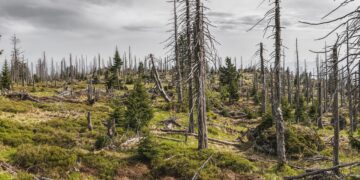The Devastating Effects of Human Impact on Our Environment
Human activities have had a profound impact on the Earth’s environment, leading to devastating consequences for our planet. From deforestation to pollution, our actions have caused irreversible damage to the delicate balance of ecosystems around the world. In this article, we will explore the various ways in which human impact has contributed to environmental degradation and the urgent need for change.
Deforestation
Deforestation is one of the most significant contributors to environmental destruction. Trees play a crucial role in maintaining the Earth’s ecosystem by absorbing carbon dioxide and releasing oxygen. However, the relentless cutting down of forests for agriculture, logging, and urban development has led to a loss of biodiversity, soil erosion, and an increase in greenhouse gas emissions.
Deforestation not only threatens the habitats of countless plant and animal species but also contributes to climate change. The loss of trees results in less carbon dioxide being absorbed from the atmosphere, leading to a buildup of greenhouse gases that trap heat and contribute to global warming.
Impact on Biodiversity
The destruction of forests has a devastating impact on biodiversity, as many plant and animal species rely on these habitats for their survival. Deforestation disrupts entire ecosystems, leading to the extinction of species and a loss of genetic diversity. This loss of biodiversity can have far-reaching consequences for the health of the planet and the well-being of future generations.
Pollution
Pollution is another significant factor contributing to environmental degradation. The release of harmful chemicals and pollutants into the air, water, and soil has serious consequences for human health and the environment. Industrial activities, transportation, and agriculture are major sources of pollution that have far-reaching impacts on ecosystems around the world.
Air Pollution
Air pollution is a major concern, as it can have serious health effects on humans and wildlife. The burning of fossil fuels releases harmful pollutants such as sulfur dioxide, nitrogen oxides, and particulate matter into the atmosphere, leading to respiratory problems, cardiovascular diseases, and other health issues. In addition, air pollution contributes to the formation of smog and acid rain, which can have damaging effects on ecosystems and natural resources.
Water Pollution
Water pollution is another significant issue, as it can contaminate water sources and threaten aquatic life. Industrial waste, agricultural runoff, and sewage discharge are major sources of water pollution that can have devastating effects on ecosystems. Contaminated water can lead to the death of fish and other aquatic organisms, as well as the spread of waterborne diseases to humans.
Climate Change
Climate change is perhaps the most pressing environmental issue facing our planet today. The burning of fossil fuels, deforestation, and industrial activities have led to an increase in greenhouse gas emissions that are causing the Earth’s temperature to rise. This rise in temperature has far-reaching consequences for the planet, including rising sea levels, extreme weather events, and the loss of biodiversity.
Rising Sea Levels
One of the most visible effects of climate change is the rise in sea levels due to the melting of polar ice caps and glaciers. As the Earth’s temperature continues to rise, sea levels are expected to increase, leading to coastal erosion, flooding, and the displacement of communities living in low-lying areas. Rising sea levels also pose a threat to marine ecosystems and wildlife that rely on coastal habitats for their survival.
Extreme Weather Events
Climate change is also leading to an increase in extreme weather events such as hurricanes, droughts, and heatwaves. These events can have devastating effects on communities, causing loss of life, destruction of property, and disruption of food and water supplies. The frequency and intensity of extreme weather events are expected to increase as the Earth’s temperature continues to rise, posing a significant threat to human health and well-being.
Conclusion
The devastating effects of human impact on our environment are clear, and urgent action is needed to address these challenges. From deforestation to pollution to climate change, our actions have led to irreparable damage to the Earth’s ecosystems and natural resources. It is essential that we take steps to reduce our environmental footprint, protect biodiversity, and mitigate the effects of climate change to ensure a sustainable future for generations to come.












